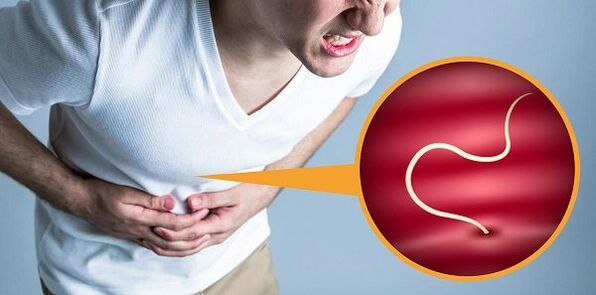The signs of parasites in the human body depend on the type of specific parasite and the products of his life.One of the most common signs of the presence of parasites in the body is intestinal and gastric discomfort.
According to WHO statistics, about 95% of the entire population of the earth is infected with parasites: microorganisms that exist and eat at the expense of other bodies.Often, the signs of parasites in the human body are ignored, since some of them have adapted very well and the signs can be exchanged for other diseases.
Varieties of parasites that often affect the human body
The human body is often populated:
- Askarides;
- Pinworms;
- ankilostomomi;
- Lambilia;
- Blazogovans;
- Bull champion;
- large tape;
- Pork chapter;
- echinococcus;
- Trichinella.
Elmininti are the general name of the worms that exist in a living organism.In a nutshell, worms.They are classified according to the following types: ribbon worms (Cistodi), saucers (Trematodi) and round worms (nematodes).The most common type of Elmininti are the round worms.
They have a round shape and live mainly in the intestine, of its various departments.Some of the representatives, for example Trichinelles, can migrate throughout the body.The intestine is the main place for the life of the nematodes by the representatives of the tape parasites: bull and pork tension, wide ribbon, echinococcus.The size of the parasites in question can reach several meters in length.Some of them begin to develop outside the human body.

Taurus and pork ribbons, for example, penetrate the intestine in the intermediate phase.Ensaliers can settle in various organs.They feed on blood cells, moreover, they can use intestinal content, mucus, etc.Their length reaches up to half a meter.These include the liver and feline Bicom, the schistosome, etc.For the type of development of helminths, they are divided into biogelinter, geogelminers and contact parasites.
Biogelinters exceed the stadium of maturation and development in animal organisms.This, for example, Tossocar, Intelligence of Bulls and Pork, etc.Geogel -interternity develop in the ground.And they enter the person through the skin or swallowing.These include many types of round worms.Contact parasites penetrate into a person with direct contact with another person.Enterobiosis is one of the diseases transmitted by contact parasites, Pinworms.
How the infection occurs
You can be infected with parasitic larvae by eating unskilled foods (fish, cloak), crude crude crops and fruit, when insect bite, during sexual intercourse, domestic water and swallowing water, while swimming in ponds, pets, through the ground.
General signs of the presence of elmininti
Very often it is quite difficult to recognize the presence of parasites in question in the individual's body.And many symptoms can be exchanged for a chronic disease and treat it without success.The symptoms of the disease may vary according to the variety of worms, the place of their location and quantity.But there are common signs of parasites in the human body.
Allergy
As a result of metabolic processes, worms distinguish toxic elements that penetrate the blood system and contribute to the occurrence of allergic manifestations.The rash can periodically appear and disappear.This allergy is poorly treated with dermatological agents.
Allergy may appear:
- tears, hard of the eyelids and conjunctivitis
- Nose that chronic cola
- lack of breath, cough
- skin eruption on the skin, peeling and redness, burning
- Anguille pink, eczema
- jams in the corners and inflammation of the edge of the mouth
- Leukocytosis is an increase in blood leukocytes
- scabies in the anus area (Pinworms) and on the body
- Leather and acne problem
- Astma and dry cough (ankilostoma)
- hair loss
Gastric and intestinal discomfort syndrome
Many parasites populate the individual and tenuous intestine of the individual.They are attached to the walls, irritate them and contribute to the occurrence of inflammatory processes in the organs.The nutrient suction function, in particular succulent substances, is compromised.
A large amount of fat elements in the stool can be found with laboratory methods.
Stagnation of the bile
Due to their enormous size, some parasites can block biliary ducts and cause biliary trait hall.These signs can cause other more serious liver diseases.
Constipation
Vermes can obstruct intestinal light.Often the signs of parasites in the human body manifest themselves from symptoms such as constipation and can even lead to intestinal obstruction.
Diarrhea
Diarya is one of the most common symptoms of elminints infection.Prostaglandins, produced by parasites, lead to a frequent watery stool.
Dysbiosis
Due to the compromise of the intestinal function, symptoms such as diarrhea, constipation, formation of excess gas, which can be mistaken for dysbiosis, occur.But in this case, the treatment with antibiotics and probiotics does not provide positive results.
Reduce immunity
Parasites feed on what a person eats.They absorb most of the digested nutrients.
Due to the constant response of the immune system in the presence of "strangers", the defenses of the body are reduced, immunity weakens.This manifests itself from frequent colds, an unreasonable increase in temperature, a smoke in the body, etc.
Joint pains and muscles
Verms can affect several organs.Tricinelles, for example, are deposited in muscle tissue and can damage it.This is the response of the body to the vital activity of parasites.
Changing body weight
One of the signs of Elminiasis is a decrease in body weight or obesity.The reduction of weight occurs due to the impossibility of obtaining nutrients from the products consumed.And the weight gain, due to the reaction of the body, the need to "escape food for the future".Therefore, before making a decision on the set or on weight loss, it is necessary to undergo a complete examination for parasites in the human body.
Anemia
Some parasites, Trichomonas, for example, can influence various human organs, including blood.Eating its cells, elmintiasis causes anemia and iron deficiency.
Avitaminosis
A person lacks useful substances and vitamins, who cause vitamin deficiency.This is a consequence of the parasitic gluttony.
Nervousness, sleep disturbance
Insomnia, a bad short sleep, can be the response of the nervous system in the presence of "illegal" inhabitants.Some helminths at night go out of the anus, to lay the larvae.This can cause discomfort and itching, which often makes it wake up and does not allow you to rest completely.
"Chronic fatigue syndrome"
Against the background of the general intoxication of the body, the lack of vitamins and nutrients that are absorbed by parasites, the individual can feel constant effort, a decrease in concentration, apathy and the deterioration of memory.
Oncology
The presence of parasites does not better affect the human body as a whole.The normal functioning of all organs is compromised, inflammation occurs, wellness worsens, immunity is reduced.The violation of the normal functioning of the body due to the influence of parasites can lead to sad consequences.
It is important to know that all these signs, with prolonged action, can cause the formation of tumors and neoplasms.
Inflammation of the larynx and respiratory tract
Vermes can travel through the body.Having reached the respiratory tract, they cause a strong cough, tonsillitis and an increase in body temperature.As a result of their life, asthma or pneumonia can also develop.
Do not ignore all types of symptoms that indicate a violation of the body.In the first manifestations of the signs of any of the diseases, it is necessary to immediately consult a doctor, pass through the procedures to check the parasites.This will allow you to obtain timely treatment and will not allow the destructive effect of toxins to damage your ways.The long -term discovery of worms in the human body can lead to the development of serious disorders, including the oncological or chronic forms of existing diseases.
Specific symptoms of parasitic infection
In addition to the general, there are a series of special signs of the presence of parasites in the human body, which are inherent in women and men separately.
For women it is:
- violation of the cycle of regular menstruation;
- vaginal dysbiosis, mycosis;
- Inflammation of the ovaries, kidneys, bladder;
- Fibroma of the uterus;
- infertility.
For men, the disease in question is manifested:
- sexual dysfunction;
- the presence of sand or kidney stones, bladder;
- Inflammation of the prostate gland;
- mental disorders.
Differences in signs in children and adults
When the parasitic larvae affect, they face 3 -level protective barriers:
- saliva;
- gastric juice;
- Local intestinal immunity.
In the body for children, still fragile, this protection may not work.And they are the children who are more susceptible to the disease in question.In the summer, when the children are constantly on the street, the risk of infected by Elmininti is very high.The ways of infection for children are more than enough: sandbox for children, pets, not always washed and vegetables, swimming in the basins.In addition, this is particularly true for the smallest, the desire to taste everything.
The habit of sucking the fingers only adds the probability of capturing an elmintic invasion.The most common types of parasites in children include: Pinworms, Ascaris, Vlasov, Toxocar.The tips are small white worms, no more than 1 cm in size.They come out and lay their eggs near the anus.Therefore, the presence of these parasites is always accompanied by the itching around the anus.Askarides is bigger, their length can reach 40 cm!
With the Elmintic invasion, children, first of all, observe signs such as lack of appetite, pallor of the skin, a decrease in body weight.A delay in mental and physical development, memory disorder can also indicate the presence of parasites.With their life, the worms cause a violation of the metabolism, a decrease in immunity in a child.All this manifests itself from frequent viral infections, allergic reactions.
Please note that a phenomenon such as "bruxism" (grinding with teeth) is considered one of the signs of the presence of parasites in the human body and often disturbs children in a dream.Parents should pay attention to this fact and lead an examination of the child for parasites.Very often, worms live in the intestine, so children can have problems with stools, flatulence, vomiting, pain in the epigastric.

Diagnosis of parasites
The main problem in the diagnosis of parasitic diseases is that they are masked by many chronic disorders and it is very difficult to recognize the true causes of symptoms.
How to determine the presence of parasites
In case of damage to one or the other body and fabrics, the distinctive characteristics dominate.
In the intestine
The most favorable place for the life of parasites: the humidity is high, the temperature is hot, the pH is neutral.Symptoms of intestinal damage:
- constipation;
- diarrhea;
- flatulence;
- intestinal obstruction;
- spastic pain, pain in the abdomen;
- decrease in body weight;
- vomit;
- nervousness;
- Lack (or increase) appetite.
A person is overwhelmed by helplessness, fatigue, reluctance to move.
In the stomach
With the parasitic invasion, the following signs are noted:
- nausea;
- herottura;
- salivation;
- gravity and outbreak of the stomach;
- diarrhea;
- bleeding during intestinal movements;
- itching in the anal region due to Pinworms;
- Cough due to the irritation of gastric neurorecerators.
With the intestinal acne, the expectoration with blood fractions is possible.
In the liver
Symptoms:
- Pain in the right hypochondrium;
- herottura;
- nausea;
- allergic urticaria;
- yellowing of sclera, mucous membranes and skin;
- loss of hair bulbs;
- weakness;
- irritability;
- anemia.
There is a pronounced swelling of the legs, abdomen.
With damage to the heart
Signs of pulmonary and cardiac insufficiency are always noted.
- cough;
- dyspnea;
- nervousness, fear;
- weakness;
- chest pain;
- Arrhythmia, bradycardia;
- temperature, alternation fever with chills;
- Blood pressure pressures;
- sweating;
- Pallor of the face, neck;
- anemia.
There are signs of hypoxia: cyanosis of the skin of the fingers, a triangle of the nasolabial and mucous membranes.
In the lungs
Characteristic symptoms:
- dyspnea;
- difficulty in breathing;
- attacks of dry cough;
- asthmatic bronchospasms;
- Allergic rhinite, sneezing;
- chest pain;
- quick impulse;
- nausea.
Perhaps the separation of foam foam measures with blood cells.
Under the skin
External symptoms:
- Small red pruriginosity rash, large edematous blisters on the skin;
- ulcerations, abscesses, warts, eczema;
- fever;
- Night sweating;
- Mobile tumor areas dense under the skin;
- anemia.
Allergic cough, the nose that cola often develops.
In the eyes
Distinctive symptoms:
- Inflammation of the conjunctiva, accompanied by burning and itching;
- Sculpture in the eyes and pain when moving the look of the side, upwards;
- flying flies, muddy threads in front of the eyes;
- dry mucous eyes;
- Investability of vision of objects, forklifts;
- headache, dizziness;
- swelling of the eyelids;
- He was under his eyes.
There is a significant deterioration of visual acuity.
In the blood
Parasites living in the blood can live both in red blood cells and in plasma and white blood cells.Types of parasites:
- Mansonella is a shine that can grow up to 8 centimeters.Due to dizziness, head pain and joint, fever, skin problems, legs of the legs.
- Emestoridia is unicellular erythrocytes living in red blood cells.
- Tripanosomes - Unicellular, causing diseases of shagas and sleeping diseases.
- Plasmodium Malaria.
Parasitosis is masked as thousands of diseases, so it is impossible to promise it visually, without laboratory research.The period of care depends on the accuracy of the diagnosis and the identification of parasites in the first phase of the infection.
Symptoms of diseases caused by parasites
Very often the disease is called a parasite that the cause.

Acaridosis
The causal agent of the disease is the Verme Ancaride, which is located in the human intestine.The degree of disease depends on the age of the patient, the gravity and prescription of the parasite invasion.
The symptoms of ascariasis are manifested as follows:
- An allergic eruption that is located on the feet, brushes and body of the patient;
- increase in temperature indicators, fever;
- General weakness and malaise;
- sweat at night and day;
- liver enlargement and painful pain in hypochondrium;
- lack of appetite and nausea;
- pain and cramps in the abdomen;
- constipation and diarrhea;
- weight loss or increase;
- cough, lack of breath and thoracic pain occurs during the migration of the Ascaris and their location in the lungs;
- insomnia;
- decrease in cognitive skills;
- convulsions;
- Mechanical jaundice and intestinal obstruction.
Toner
The causal agent of the disease is a chain of bulls.Tusiarinchosis occurs from the following symptoms:
- nausea, burning of stomach and vomiting warning;
- increase in salivation;
- discomfort in the intestine, which manifests itself for flatulence, constipation, diarrhea;
- intestinal obstruction;
- Bile block;
- General weakness and malaise;
- deficiency of anemia and vitamin;
- dizziness and headache;
- insomnia;
- irritability and nervousness;
- Dot in the work of the cardiovascular system, which manifests itself from tachycardia and hypotension.
Entertainous
The disease is caused by worms of cuts, which are also called worms.This is the most common parasitic disease that occurs in almost every second person.Symptoms of entertainable:
- itching in the anus, which manifests itself more often at night, which is caused by the migration of Pinworms females to lay eggs in the rectum;
- Local redness of the skin around the anus, up to the formation of the eczema;
- Bruxism, sleep disorder, fatigue, nervousness and irritability;
- Incontinence to urine in children;
- Spasms and abdominal pain;
- deterioration and lack of appetite;
- constipation and diarrhea;
- increase in the formation of gas and discomfort in the intestine;
- nausea and vomiting;
- Allergies manifested as atopic dermatitis, allergic conjunctivitis, asthma;
- dizziness and headache;
- decrease in cognitive skills;
- worsen memory and attention;
- Increase in nervousness and irritability.
Toxocarosis
The causal agent of the disease is a parasitic toxocar worm, which affects the organs and tissues of a person.The disease is widespread because for a long time it is hidden with dark and blurred symptoms.The explicit clinical symptoms occur in the late phases of the infection.
Toxocarosis signs:
- The main symptom of this disease are allergic eruptions on the skin that spread throughout the body;
- Quincke's edema develops following the swelling of the skin in the upper part of the face and neck, which can lead to the suffocation and death of the patient;
- Bronchial asthma manifests itself in the form of persistent paroxysmal dry coughs with expectorated elements.increase in temperature indicators;
- loss of appetite, headache;
- Increased lymph nodes.
In case of toxocarosis, the worms are able to migrate and locate in the internal organs, eyes, brain and tissues of the epidermis.
Anquilostomidosis
The causal agents of the disease are helminints, ankilostomids and not -core.Symptoms of the disease:
- Orticaria and dermatitis, when the larvae penetrate through the skin, therefore in the place of penetration swells, which causes burning and itching;
- Bronchitis, tracheitis, laryngitis are observed during the migration of parasites on the human body, in this case the patient is tormented by cough, lack of breath, by the Raucendine;
- ко wit линки достииtent кечечечника, то развивается анемия, рота, тнота, боли в жto, запоры, диареny, поsetапетита;
- irritability, fatigue, insomnia.
Defendacobleosis
The disease causes a large ribbon.Symptoms of the disease:
- weight loss;
- diarrhea and constipation;
- worsening of appetite;
- subfebral temperature;
- increase in fatigue and fatigue;
- the presence of worms in the form of white tapes in the stool;
- Spasms and abdominal pain;
- anemia;
- dizziness and headache;
- Red crepes and spots in the language;
- Processing pathologically in the mouth and esophagus;
- intestinal obstruction;
- depression.
Tenosis
The causal agent of the disease is a chain of pork that is located in the small intestine.Symptoms of the disease:
- Nausea and vomiting, fragments of parasitic larvae can be observed in vomiting;
- diarrhea and constipation;
- weight loss and appetite;
- Spasms and abdominal pain;
- anal itching;
- dizziness and headache;
- insomnia and excitability;
- With the arrangement of the larvae in the brain, cystiscosis develops, which manifests itself from a compromised discourse, epilepsy, delirium, hallucinations, loss of consciousness;
- During the migration of the parasite, it is able to penetrate the eyes, heart and lungs.
Echinococcosi
The causal agent of the disease is the elminto of the Echinococcus ribbon.The worm is dangerous as it is able to form a cyst in almost all internal organs: heart, liver, brain, lungs, etc.The disease is very insidious, since the first time is completely asymptomatic and clinical manifestations are already observed in the subsequent stages of the formation of an echinococcal cyst.
Symptoms of the disease:
- the presence of pain at the place of formation of cysts;
- weakness, increase in fatigue, sleepiness;
- Allergy to the skin in the form of urticaria and itching;
- Violations in the work of the organ concerned: if the liver is interested, then appetite worsens, nausea and vomiting, if the lungs are affected, then there is a cough, the lack of breath, an increase in temperature, if the brain, the paresis of the arms and the legs occurs, when the cyst is trained in the heart, the development of serious heart disease is possible;
- When a rupture of the cyst, parasites spread at high speed to all internal organs and systems, which can lead to very serious complications and even to the patient's death.
Alveococcos
The causal agent of the disease is the Alveococcus strip.This disease is considered slow: from the moment of the infection to the development of the disease, 10 or more years can pass.Symptoms of the disease:
- Dermatological manifestations: itching of the skin and urticaria;
- bitterness in the mouth, nausea;
- Pain and sense of gravity in the right hypocondry;
- liver colic;
- In the liver there is a seal;
- weight loss;
- weakness and malaise;
- When the parasite is located in the brain, serious headache and dizziness are observed.
Lambliosis
The disease develops due to the infection of the human body with intestinal lambia.Sometimes asymptomatic transport occurs, without evident signs of the disease.Symptoms:
- Violations in the work of the gastrointestinal tract: nausea, vomiting, erottating, diarrhea and constipation;
- Specific pains in the navel;
- loss of appetite, flatulence;
- fever;
- General fatigue, decrease in performance;
- irritability and nervousness;
- Itchy skin.

Amoebiasi
This disease is caused by histological amaea.Sometimes the symptoms of the disease can be completely absent, and sometimes on the contrary, manifest themselves in a very vivid way.Symptoms occur with two forms: intestinal and extracurricular.In the extra -closet form of Amebiasi, lungs, brain, parental parent system, the skin is influenced, but the intestinal form is often common.
Symptoms of intestinal amebiasis:
- painful diarrhea, with frequent calls (up to 20 times), sometimes with blood;
- stomach pain;
- increase in temperature indicators;
- vomiting and nausea;
- Loss of appetite.
After some time, the symptoms of the disease can disappear independently, for a while, therefore manifest themselves with renewed vigor.
Shistosomosis
The causal agent of the disease is a blood of a blood size by a schistos.The disease has several development phases:
- In an initial phase, the patient develops allergic reactions, which manifest themselves from skin eruptions and swelling, a cough with hemoptyses, which has a paroxysmal character, with general malaise and pain in the joints and muscles;
- ког claims болез приобретает хScioseческий характер, т с oma рези мочочеисmo nyinc.девное недеased
- There are particularly difficult cases that lead to the patient's death.
There are many symptoms of parasites in the human body.Without laboratory tests, only on the basis of the symptoms themselves, it is impossible to diagnose the presence of parasites in the body.The severity of the symptoms mainly depends on the protective mechanisms of a person, on the place of distribution of the parasite and its type.
Methods to diagnose parasites
Direct methods:Calais analysis, urine analysis, scraping of the perianal region, subtyo phalanges, analysis of the expectorate and duodenal content.
To study the presence of parasites in the body, UZD is also used.
Indirect methods: X -Ray, morphological, ultrasound, biopsy.
Bioresonance methods: Foll method, v.



















